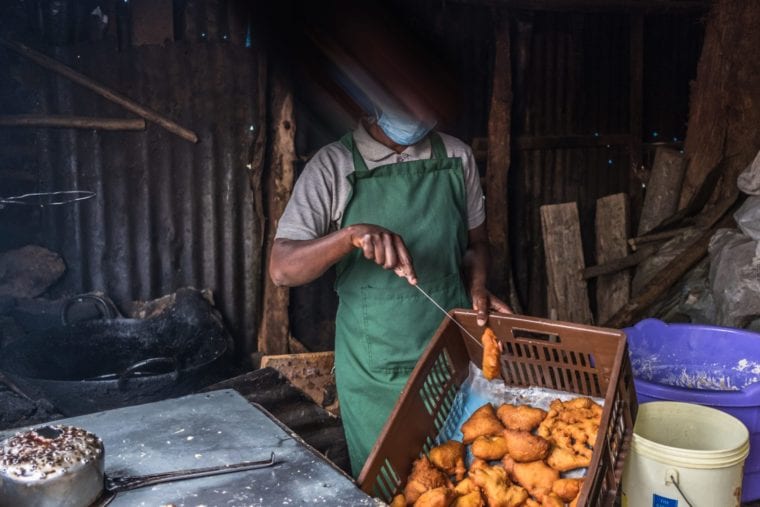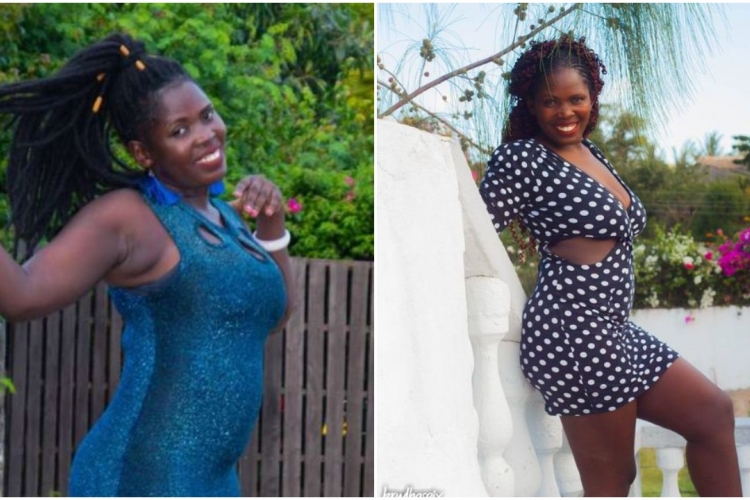Share this
Rehema* prepares Mandazi in her home to sell to her neighbours, using the money she received from the EU-funded safety nets programme, in Kawangware Informal Settlement, Nairobi. Photo By Brian Otieno / Oxfam in Kenya
The unspoken inequality of the COVID-19 pandemic
243 days ago, on a feverishly hot Wednesday afternoon, Kenyan President Uhuru Kenyatta stood in the manicured State House grounds wearing a pressed, blue-diamond checkered shirt and a sombre frown.
“Fellow Citizens, the Coronavirus Pandemic is an unprecedented global health crisis,” the president warned an anxious nation.
But the president’s speech was also full of cautious hope.
He reassured us that we would overcome the pandemic by tightening our belts and obediently following the national health guidelines and laws created to curb COVID-19.
Almost 7 kilometres away, the heat would have been unbearable in Kibera that afternoon, where 47-year-old Priscilla Ngilla, and 25-year-old Emmaculate Onyango live in informal housing with their families.
Ngilla and Onyango were not listening to the president’s speech that afternoon.
They were working their day-jobs cleaning public school hallways and washing clothes for wealthy clients to make their daily take-home of Ksh.100 – 1000 per day that provides for their families.
Had they been listening to that speech, they would have known that whereas wealthy and middle-class Kenyans would be able to wash our hands every 30 minutes, isolate ourselves from others and work from home, they probably wouldn’t.
Like too many of their counterparts around the globe, they would have realised that there wasn’t a comprehensive national insurance to protect informal workers like them from the shock to come.
The pandemic for the wealthy
It is fear that in March drove middle-class and wealthy Kenyans to the supermarkets and pharmacies in troves.
We cleared shelves of flour, toilet paper, beans, medicines and soaps; and filled our water-storage tanks to the brim.
We brazenly showed the world that when push comes to shove, middle-class Kenyans will trip over each other for ugali and toiletries. We are not animals, after all.
In our fear, we also fired our domestic workers and stopped patronizing the mama mbogas, mechanics, cleaners, messengers, cooks and other informal workers who were once daily features of our lives – even, almost family.
Almost.
The Pandemic for Kenya’s Informal Workers
Mugambi is a 32-year-old father of four. He lives with his spouse and young children in Kibera. Before the COVID-19 pandemic struck, Mugambi used to work as a driver.
“The coronavirus has really affected us people who do informal work. Before Corona, I would make around between Ksh.500 and 1000 per day. These days I make nothing,” says Mugambi.
Since the pandemic struck, forced school closures and the disappearance of domestic labour jobs also left Priscilla Ngilla’s and Emmaculate Onganyo’s households with no incomes whatsoever.
The mandatory curfew imposed by the Government forced both to forgo their jobs ending after 7 pm.
They could not risk being beaten by the police, fined up to Ksh. 10,000, imprisoned for up to three months, or all of the above.
“These days we eat one meal each day,” said Priscilla Ngilla, who provides for two small children by herself in the Kibera informal settlement.
“Food prices have risen a lot. Flour used to cost Ksh. 100, now it’s Ksh. 130” said Emmaculate Onyango, who is one of the main providers for a household of 7, which includes her three small children and her younger brother who is HIV positive.
In July, a food security study of 10 informal settlements in Nairobi showed that on average, families were able to afford less than half of the food and basic necessities such as soap they needed.
The study was conducted by a consortium of organizations including Oxfam in Kenya, the Kenyan Red Cross Society, Concern Worldwide, ACTED, Impact Initiatives, the Centre for Rights Education and Awareness (CREAW) and the Wangu Kanja Foundation.
The study found that 54.8% of informal settlement households were severely food insecure, and only a quarter of households had at least one stable income earner.
If this worrisome trend holds for all of Nairobi’s informal settlements, nearly 1,446,549 million Kenyans in our capital city could currently be experiencing severe hunger in their households.
Kenyans like Ngilla and Onyango have had to reduce their family’s meals to one or less per day. They are incurring debts from neighbours, food vendors and landlords, and are sacrificing their own nutrition to make sure their children can eat.
Unfortunately, sometimes that is not enough. According to the Concern Worldwide, over 40,000 children living in informal settlements in Nairobi were already acutely malnourished as of May.
This undernourishment could lead to long-term negative developmental and cognitive effects in the children and significantly impact their future abilities to cope with and lift themselves out of the poverty they were born into.
These are the young citizens – quite literally the future of our nation, that must be supported in their most vulnerable moments.
If we are not careful, like so many things, COVID-19 could be yet another driver for the expansion of the gap between the Kenyan rich and poor. But inequality has been a feature of our nation since it was given an anthem.
How can we possibly address this endemic issue during the greatest health crisis our country has ever faced?
As is often the case, we start from the bottom.
Dear Mr. President, Kenyans Need Social Protection
If we could turn back the clock to that hot afternoon, and modify the president’s speech into a conversation with Kenya’s most vulnerable workers, like Ngilla and Onyango, they would have likely said that they cannot social distance in our cramped informal settlements – where 60% of the Nairobi population is crammed into 6% of our city’s geographical area.
They would likely have said that it was a challenge for them to wash their hands every 30 minutes, because they cannot afford soap or water with no income, and clean water points in informal settlements are sometimes few and far in between.
In fact, informal settlement residents like Ngilla and Onyango pay up to 172% more for water to private vendors and cartels, compared with affluent high-income families in areas like Lavington.
They would have likely said that staying home is not an option for many informal workers who need to keep feeding their families with little to no savings or social security – especially mothers and caregivers.
Under the national Inua Jamii programme, 1,094,323 vulnerable Kenyans have been receiving between Ksh.2000-2700 since January, says the government.
While every little bit helps, as much as 61.9% of the Kenyan workforce was estimated to be out of work due to the pandemic in June, according to the Kenya National Bureau of Statistics.
The International Labor Organization estimates that a low-income country like Kenya needs to spend only 5.6% of it’s Gross Domestic Product (GDP) to create a basic package of social assistance covering universal child grants, maternity benefits, disability benefits, and old age pensions across the country.
With a GDP of KSh 10.8 trillion in 2019, Kenya would have to spend KSh 604.3 billion to provide this basic coverage to all vulnerable Kenyans, according to ILO estimates.
We live in a country where the richest 8,300 individuals, including several government officials, own more than 44 Million Kenyans; where an estimated Ksh. 108.3 billion is lost annually to corporate tax dodging; where Ksh 35.9 Billion is spent on tax breaks for corporates – almost double our spending on free primary education, according to the World Bank; and where we are all just one degree of separation away from our poorest compatriot who is without any safety net in times of crisis.
Clearly, we can afford to do more.
Social protection and universal basic healthcare have been enshrined in the Kenyan Constitution since 2010. However, in times of great need, are our emergency policies working proactively to implement and uphold these rights?
Despite the great need for an expansion of social assistance programmes such as Inua Jamii during the pandemic, we chose as a nation to reduce corporate tax and income tax for all citizens, but high-income individuals save more proportionally.
In times of great need, progressive taxes on high-income citizens are vital sources of public financing that can be used to help our most needy.
Kenyan Testimonies for Social Protection
In June, to quickly expand support to vulnerable informal workers, the consortium of seven organizations mentioned above, funded by the European Union, launched a Safety Nets programme.
By December, the Safety Nets programme will have transferred Ksh.422,558,039 in relief funds via MPESA to 73,700 vulnerable households in Kenyan informal settlements.
These include 4,024 survivors of sexual and gender-based violence. The money is providing them with a dignified way of fulfilling their basic needs, helping them afford basic necessities such as food, water, soap and housing during the COVID-19 pandemic.
If you had not sent me that money, I wouldn’t be here in this house. I would have been chased away. But thanks to what you gave us, I was able to divide it a little and pay for rent, and clear a food debt I had borrowed nearby,” said Priscilla Ngilla, who received a cash transfer of 5,641 KSh from the Safety Nets consortium in April.
“The money really helped us. We used it to buy food and household goods, and now that there is food and soap at home, it is easier to follow the government’s guidelines to stay at home” said Evans Mugambi, who also received 5,641 KSh from the Safety Nets consortium in April.
Meet Rehema*. Her real identity has been disguised as her attacker is still at large.
Before the COVID-19 pandemic, Rehema* lived with her husband and two children. She worked at a hotel where she earned Ksh. 250 (€1.98) daily.
When the pandemic struck. She lost her job, her husband attacked her with a knife and threw her and her two young children out into the cold.
She received Ksh. 7,780 (€61.48) from the “Safety Nets” programme in August to help her afford basic necessities, and reduce her vulnerability to violence.
“We were about to be evicted. That day, the children had not eaten anything at all. I immediately took Ksh. 5,000 (€39.51), and paid our rent. I then bought food and stocked my pantry. Now, my children eat breakfast with tea and mandazi. They eat lunch, and even supper,” said Rehema.
Our nation’s independence was forged on the premise that all Kenyans – Evans, Emmaculate, Priscilla, Rehema,* and the millions of other informal workers – would be equally protected by the state, not because they can afford it, rather because they are entitled to it as Kenyans.
Our constitution goes further to enshrine every Kenyan’s “rights” to adequate food, shelter, and healthcare.
It is about time we “put our money where our mouth is” and developed a comprehensive social protection programme – a system that intervenes to protect the millions of vulnerable informal workers from poverty and destitution when they lack income and during shocks like the COVID -19 pandemic, rather than cater to an imaginary “Kenya” in which we are all on an equal playing field.
The problems of this year have been great, and the needs are many. However, it is now when our solidarity and compassion are needed most. We cannot afford to be ruled by fear.
We cannot afford to be silent.
This publication was produced with the financial support of the European Union. Its contents are the sole responsibility of Oxfam in Kenya and do not necessarily reflect the views of the European Union.




















